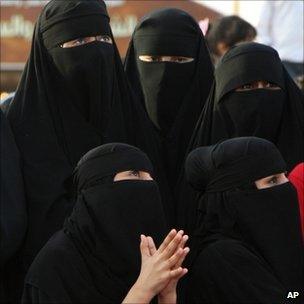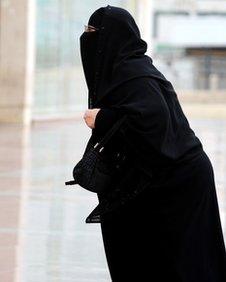Saudi Arabia women activists urge jail term reversal
- Published

Saudi women are forbidden from driving and excluded from holding high political office
Two women's rights activists in Saudi Arabia have called on their government to overturn their 10-month jail terms for inciting a woman to defy her husband's authority.
Wajeha al-Huwaider and Fawzia al-Oyouni are both well-known activists.
An appeal by the two women is due to be heard later this week.
They took up the case two years ago of Canadian Nathalie Morin, who complained of serious abuse by her Saudi husband - an accusation he denies.
The activists' high profile had seemed likely to protect them from being jailed for their outspokenness.
While Wajeha al-Huwaider spear-headed the campaign to allow Saudi women to drive, Fawzia al-Oyouni runs an influential women's rights website.
'Entrapment'
Ms al-Oyouni says they responded to Ms Morin's plea for help in a text message saying her husband had left her and her children at home without food or water.
The two women say they went to her apartment to leave food.
But Ms al-Oyouni says the text message had actually been sent by Nathalie Morin's husband in order to entrap them.
He had notified the police and the two women were arrested and charged with attempted kidnap.

In February, 30 women were sworn into the previously all-male Shura Council
That charge was dropped when they were sentenced last month.
Instead, they were found guilty of takhbib - which according to Ms al-Oyouni means inciting a wife to defy her husband's authority.
The ten-month jail sentence they were given - plus a two-year travel ban - has been condemned by human rights groups.
An activist for the group Equality Now, Suad Abu-Dayyeh, told the BBC that it appeared the authorities wanted to silence the two women for their history of fighting for Saudi women's rights.
King Abdullah has made moves to give women more rights - with seats on the influential Shura Council and the right to vote in the next municipal elections.
But activists say these have so far been largely symbolic.
The key issue for women's rights campaigners of male guardianship remains off limits for now.
Suad Abu-Dayyeh describes the two women as heroes fighting incredible odds to ensure a better world.
- Published20 February 2013
- Published18 May 2013
- Published11 January 2013
- Published13 December 2012
- Published23 November 2012